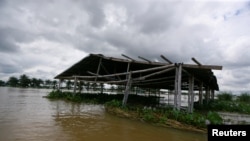The 1,800 hectares of rice, maize, sorghum and sugar cane in Emitowa, a remote community of grain farmers and cattle herders, has been in Umar's family for four generations. But if his father were alive, he would be deeply saddened by what has become of the farm, 40-year-old Umar said.
Umar said torrential rains last year had buried his fields of harvest-ready rice and sorghum in more than a meter of water, leaving him with nothing to sell.
"The water was up to here," he said, pointing to his shoulder as he walked through empty fields that were once a vast plain of green rice shoots and tall sugar cane stalks.
"It carried away all 900 hectares of rice we planted," Umar told the Thomson Reuters Foundation.
His family is one of the thousands of farming households in Niger state whose primary source of income was wiped out by record-breaking floods across the West African nation.
Nearly 700,000 hectares of farmland in northern Nigeria was damaged, at least 600 people killed and millions forced to flee their homes in the West African nation.
The floods came just as farmers prepared for the harvest. Now there are fears for food security.
Nigeria said it would spend $2 million to repair flood damage and donor agencies have pledged to support farmers in nine of Nigeria's 36 states with seedlings and fertilizers.
In January, the United Nations Children's Agency (UNICEF) estimated 19 million Nigerians, mostly children, were in desperate need of food and said that come June the number would increase to 25 million.
Nigeria was still emerging from coronavirus lockdowns that disrupted the planting cycle when Russia's invasion of Ukraine last year dealt a major blow to the fertilizer and grain supply chain across Africa, said Ayokunle Afolabi-Toye, professor of agriculture at the University of Ilorin in western Nigeria.
"Nigerians are groaning under the weight of the food crisis, perhaps more so than is the case in the developed west where governments have stepped in to provide subsidies on food, and welfare interventions to favor the most vulnerable families in the society," Afolabi-Toye said.
Indebted farmers lament
Now the floods have receded, many thousands of hectares remain uncultivated as weary and debt-ridden farmers say they cannot afford all the seed they need to replant their fields.
Planting season has now come round again in Sosa, a rice-growing settlement on the River Niger flood plain, but the land is parched and bare.
Muhammed Chado, 58, said he had borrowed 5 million naira ($10,870) to purchase rice seedlings from the community bank last year and took out a 25-million-naira government-backed loan to buy fertilizer, but he cannot pay back the debts.
"I took everything on credit ... now we have nothing to assist our wives. Our children ... no school fees," he said.
He only planted 10 hectares of rice after selling a herd of cows, compared to the 4,000 hectares he sowed last year.
His wife, Kuburat, said she had watched helplessly last October as rising waters ruined the tomatoes and sweet potatoes she had grown to supplement her husband's rice crop.
As fast as the waters came, they also went, sweeping away a makeshift dam and leaving villagers unable to irrigate their fields, she said.
Kuburat said women would now normally be transplanting rice seedlings from nursery beds to the main fields, but had been forced to find other ways to try to make ends meet.
"We go to fetch water from the river to sell to farmers and cut firewood to cook something to feed our husbands and children," she said.
Reduced cultivation is a big blow to Nigeria's plans to be self-sufficient in rice - a staple for many. Outgoing President Muhammadu Buhari banned rice imports and his government subsidizes fertilizers and gives credit to farmers to try to boost domestic production.
Aminu Goronyo, president of the Rice Farmers Association of Nigeria, said his group had been battling insurers to pay out compensate and had contacted lawyers to start legal proceedings.
But he said there was no cause for alarm and dismissed concerns about rice production. He said he was optimistic that meetings President-elect Bola Tinubu had held with agricultural groups would lead to more support for farmers.
Rice production in Nigeria is nevertheless expected to fall to 7.8 million tonnes from 8.4 million last year, the U.S. Department of Agriculture said. Prices would spike, it said, due to rising production costs and flood damage.
Deforestation increases flood risk
Floods in Nigeria are nothing new, but officials said months of heavy rains coupled with the release of excess water from a dam in neighboring Cameroon and runoff from three full Nigerian reservoirs had contributed to the worst flooding in a decade.
Widespread deforestation to create more farm land also contributed to the extensive damage, said Mohammed Yakubu, an irrigation official from the agricultural development agency.
Yakubu, who works with distressed farmers in the rice-producing state of Niger, also home to the country's largest reservoirs, said it was not enough for farmers to grow rice, they had to plant trees to trap rainwater and stop flash floods.
"If there are few trees to stop the runoff from the upper lands and rivers, then we should expect that every drop of rain will flow downstream and damage crops in the lower plains," Yakubu said.
He said investing in water management infrastructure such as earthen dams to collect floodwater for irrigation during the dry season should be the government's priority.
